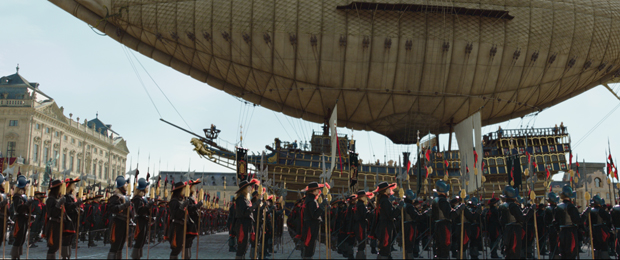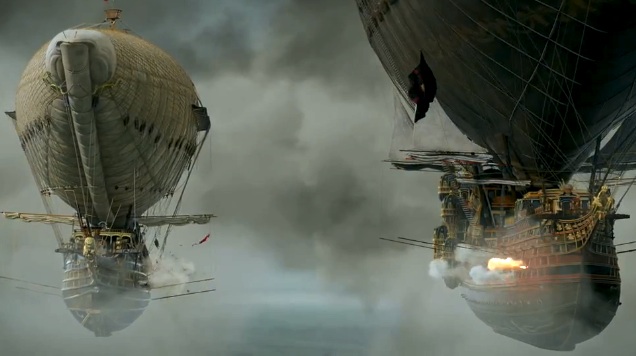Last updated on March 4, 2013
Well, here’s a post I thought I’d never be writing even one or two days ago.That’s life for you.
A few nights ago, I had the opportunity to watch the new Three Musketeers film (of last year; I am really behind). I like the light-hearted swashbuckling action of such movies, even if they’re flashy and lack in substance. That’s not really why you’re watching these kind of movies, anyway. You hope for some interesting fights scenes, witty dialogue, interesting characters (but only interesting in that surface kind of way), and a happy/resolved ending for all. The recent Pirates of the Carribbean movies excel at this genre, even if the second and third entries became too bloated with plot at the end.
I was having a great deal of fun, when all of the sudden the airships appeared.

Yes, they prefaced their appearance with a raid into Leonardo Da Vinci’s vault, but it’s not like Da Vinci’s plans were anywhere near complete or anything of the sort; to build an airship, it’s almost required that the same technology and knowledge that powered the German zeppelin actually exists. Considering this movie starts with the pretense of a historical, grounded, and straightforward account of the events, what is the deal with the airships? I mean, seriously, these are “war machines”? We’re in the 18th century, guys! For God’s sake, at least explain how they work!
There’s so many problems with this that I don’t even know where to begin. First, how are they piloting these things? In Final Fantasy, at least, we can just say “magic did it” and move on our way. Those airships have propellers so that the person piloting the craft can move in three dimensions, but these airships do not. They fly with the power of magic in a movie without magic established in any scene. In the first Pirates film, for example, the supernatural element remains front and center throughout and becomes a central tenet of the plot. Because of this, the audience can accept when skeleton people can’t die, or can breath underwater, or anything like that happens in the events of the plot. Furthermore, it establishes the rules of how they became ghosts, and then how they can remove the curse and become mortal (being used multiple times in the pivotal final scenes). Again, it’s a fun movie, but the script establishes rules and adheres to them.
In this, though? Airships are cool, therefore they are in the movie.

Why does one airship have a hull that makes canno fire bounce off, while the other takes damage? Why don’t they just fire at the blimp portion so that the ship sinks? If they’re using helium, hydrogen, or some gas that floats to power these crafts, are those flammable, and wouldn’t they cause the whole ship to explode nearly instaneously? For all the film’s talk about “war machines”, they must be the most impractical things of the sort, and I can’t imagine anti-air artillery fire would simply fail to manifest in lieu of this new threat. How would you defend such a glass cannon when two people with daggers can just poke a hole in it?
None of this is explained, and thus it distracts us from the film in a major way because, well, the entire REST OF THE MOVIE INVOLVES AIRSHIPS. The Three Musketeers turns into an exercise of examining airship travel because it immediately breaks your suspension of disbelief when these “things” turn up everwhere. There’s too much presented to the audience without any explanation, and all I could think about for the last thirty minutes was the stupid airships. Also, since when was The Three Musketeers about airships, anyway? I can accept them killing or disabling ten times their own numbers, but this? NO. It doesn’t make any sense from any angle; it just simply doesn’t. And now all I can think about is other things in the movie that make no sense, like the ninja-scuba diving helm in the beginning, or why Da Vinci would even have a vault to protect his ideas. Seriously, movie, why!?
Now, how does this have anything to do with theology at all, other than my penchant for thinking about aspects of films too closely? The Bible, in fact, establishes the rules from the get-go. We have a God who is omnipotent, omniscient, and omnipresent. These characteristics aren’t directly stated, but even a cursory look at the Hebrew Bible/Old Testament would confirm much of it. However, the text gives you just enough evidence to accept it without understanding it.
That, to me, becomes nothing short of miraculous. And that kind of consistency in sixty-six books? Even more amazing. The point of it, from my perspective, is that we are given just enough information, exactly what we need, to understand what exactly is going on and who exactly God is. In other words, the explanantions only go to a point. They move torwards the point of comprehension, but the full idea is, in a way, eclipsed. But this seems to me to be intentional. Let’s take an example.
In Exodus 17, we’re told of the Amalekites, who attack Israel. To win, God uses an unorthodox strategy, to say the least; as long as Moses’ are are held up, the Israelites will win. If his arms fall to his side, they lose.
Then Amalek came and fought against Israel at Rephidim. 9 So Moses said to Joshua, “Choose men for us and go out, fight against Amalek. Tomorrow I will station myself on the top of the hill with the staff of God in my hand.” 10 Joshua did as Moses told him, and fought against Amalek; and Moses, Aaron, and Hur went up to the top of the hill. 11 So it came about when Moses held his hand up, that Israel prevailed, and when he let his hand down, Amalek prevailed.12 But Moses’ hands were heavy. Then they took a stone and put it under him, and he sat on it; and Aaron and Hursupported his hands, one on one side and one on the other. Thus his hands were steady until the sun set. 13 So Joshua overwhelmed Amalek and his people with the edge of the sword.
Do I know why God did it this way, or the technical specific behind it? Heck if I know. Not that I need to understand how Moses’ arm holding contest has anything to do with warfare. But, and this is the important part, I don’t need that explanantion. Why? Because the whole narrative has led to this point – God commands Israel to obey, and if they do, they win. If they disobey, bad things happen. It’s clear, concise, and straightforward. Did this actually happen? Sure, why not? I’d rather not put God in a box, thank you very much! Even if the events seem incredible and fantastical, the rules that God sets, and the character of God, make the history consistent. I don’t question the miracles and crazy things (10 plagues, anyone?) because they demonstrate God’s power – the technicalities of, say, God’s parting the Red Sea aren’t the concern; that He did do that is the important part, and the motive behind it. It’s unflinchingly clear, and that’s what strikes me in an era where much is unclear, a self-created postmodern world.
Wittgenstein has this to say:
Kierkegaard writes: If Christianity were so easy and cozy, why should God in his Scriptures have set Heaven and Earth in motion and threatened eternal punishments? – Question: But in that case why is this Scripture so unclear? If we want to warn someone of a terrible danger, do we go about it by telling him a riddle whose solution will be the warning? – But who is to say that the Scripture really is unclear? Isn’t it possible that it was essential in this case to ‘tell a riddle’? And that, on the other hand, giving a more direct warning would necessarily have the wrong effect? God has four people recount the life of his incarnate Son, in each case differently and with inconsistencies – but might we not say: It is important that this narrative should not be more than quite averagely historically plausible just so that this should not be taken as the essential, decisive thing? So that the letter should not be believed more strongly than is proper and the spirit may receive its due. I.e. what you are supposed to see cannot be communicated even by the best and most accurate historian; and therefore a mediocre account suffices, is even to be preferred. For that too can tell you what you are supposed to be told. (Roughly in the way a mediocre stage set can be better than a sophisticated one, painted trees better than real ones. – because these might distract attention from what matters.)
Imagine that – an end to explanations is actually the explanation itself. It’s pretty amazing that a movie about Frenchman who like to fence is less comprehensible then the God of the universe, to some degree. That’s a pretty big accomplishment for any director.
